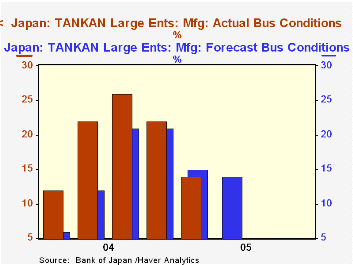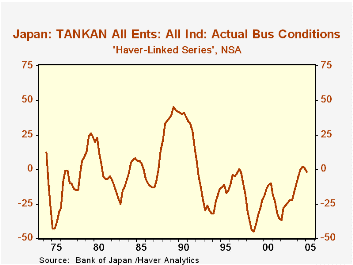 Global| Apr 01 2005
Global| Apr 01 2005Bad News -- but Not So Bad -- in Japan's "TANKAN" for March
Summary
The TANKAN Survey for March shows generally less favorable readings for Japanese business. But "less favorable that what?" News stories highlighted the so-called Headline Series, large manufacturing companies. These firms' results for [...]

The TANKAN Survey for March shows generally less favorable readings for Japanese business. But "less favorable that what?" News stories highlighted the so-called Headline Series, large manufacturing companies. These firms' results for March came at +14, well below December's +22 and also weaker than December's forecast value for March of +15. This is the lowest outturn since March last year, which was +12 and also the first time since the late 2003 reorganization of the TANKAN survey that these firms have fallen short of their own forecast from just three months prior. Thus, the "bad news" in the TANKAN report.
Other segments of Japanese business performed relatively better, however. Large nonmanufacturing firms did better at +11 than their forecast of +10 and they held steady with December's result of +11. Medium and small companies had less positive assessments of their business conditions than in December, but better than they were expecting. Medium-sized manufacturing firms, for example, saw a result of +6, considerably better than their projection of +2. The performance still slowed from December, but there was not as much deterioration as they had anticipated.
The mixed picture in the TANKAN survey follows similarly mixed readings in other measures of Japanese activity. Industrial production fell in February following a strong January gain, and services ("tertiary") activity also rose sharply in January. Unemployment ticked higher in February, but from a six-year low. Employment is very erratic, apparently struggling to establish a rising trend. The Japanese economy overall is struggling to establish a rising trend, and just as it seemed to be achieving that, much higher energy and raw material prices have acted to constrain those nascent gains. 
A reminder that in the Haver databases, we present the TANKAN data two ways. Owing to the restructuring of the survey classification scheme and new sampling last March, we have segregated the recent detail data into new series in the "Japan" database. In summary data in the "G10" database, we link the all industry-all enterprise data with the history that uses the old methodology. This broad aggregate is less affected by the Bank of Japan's reorganization of the categories. This special linked series dipped back below 0 in this report to -2, after two quarters of small positive values. Even so, these past three quarters still constitute the best performance in this series since 1991.
| JAPAN: Business Conditions: % Favorable minus % Unfavorable |
March 2005
December 2004
September 2004
||||||
|---|---|---|---|---|---|---|
| Forecast for Jun | Actual | Forecast for Mar | Actual | Forecast for Dec | Actual | |
| All Firms | -2 | -2 | -3 | 1 | 0 | 2 |
| Large Firms* | 12 | 13 | 12 | 16 | 15 | 19 |
| Manufacturing ("Headline Series") | 14 | 14 | 15 | 22 | 21 | 26 |
| Nonmanufacturing | 10 | 11 | 10 | 11 | 10 | 11 |
| Medium-Sized Firms** | -1 | 0 | -1 | 2 | 3 | 5 |
| Manufacturing | 2 | 6 | 2 | 11 | 10 | 14 |
| Nonmanufacturing | -4 | -4 | -3 | -4 | -2 | -2 |
| Small Firms*** | -11 | -9 | -12 | -7 | -9 | -9 |
| Manufacturing | -2 | 0 | -1 | 5 | 3 | 5 |
| Nonmanufacturing | -15 | -14 | -18 | -14 | -16 | -17 |
Carol Stone, CBE
AuthorMore in Author Profile »Carol Stone, CBE came to Haver Analytics in 2003 following more than 35 years as a financial market economist at major Wall Street financial institutions, most especially Merrill Lynch and Nomura Securities. She had broad experience in analysis and forecasting of flow-of-funds accounts, the federal budget and Federal Reserve operations. At Nomura Securities, among other duties, she developed various indicator forecasting tools and edited a daily global publication produced in London and New York for readers in Tokyo. At Haver Analytics, Carol was a member of the Research Department, aiding database managers with research and documentation efforts, as well as posting commentary on select economic reports. In addition, she conducted Ways-of-the-World, a blog on economic issues for an Episcopal-Church-affiliated website, The Geranium Farm. During her career, Carol served as an officer of the Money Marketeers and the Downtown Economists Club. She had a PhD from NYU's Stern School of Business. She lived in Brooklyn, New York, and had a weekend home on Long Island.





